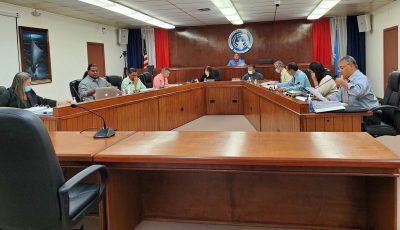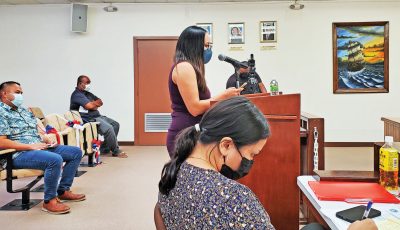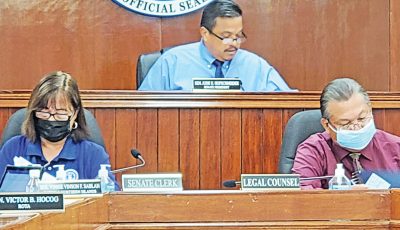Judge: CDA violated Article 12
The Superior Court ruled on Wednesday that a consent judgment that the Commonwealth Development Authority authored that resulted in the non-foreclosure of a couple’s Garapan properties and violates Article 12 of the CNMI Constitution.
Article 12, Section 1 states that “the acquisition of permanent and long-term interests in real property within the Commonwealth shall be restricted to persons of Northern Marianas descent.”
Article 12, Section 2 allows for property to be transferred via foreclosure on a mortgage and to a spouse by inheritance.
Associate Judge Joseph N. Camacho ruled that foreclosure is not the same as a “deed in lieu of foreclosure,” meaning only the property that was put up for collateral can be foreclosed, and not a substitute property.
Camacho said land is a scarce cultural resource in the CNMI and therefore the requirements of “Article 12 should be strictly enforced.”
The judge issued the ruling in a lawsuit filed by Roman Blanco Matsumoto and Lillian Manglona Matsumoto against CDA, denied CDA’s motion to dismiss the Matsumoto couple’s Article 12 claim.
Camacho, however, dismissed the Matsumoto’s allegation that CDA violated the CNMI Consumer Protection Act.
According to court records, the Matsumotos borrowed from CDA and used their lands in Garapan as collateral.
The Matsumotos did not pay back the money and CDA filed a lawsuit in 2009 to foreclose and for money due against the Matsumotos.
Instead of foreclosing on the Garapan properties, CDA authored two documents: a proposed consent judgment and a deed in lieu of foreclosure for land in As Lito—not the Garapan properties.
The Superior Court approved the consent judgment on Nov. 14, 2012.
In January 2018, the Matsumotos amended their complaint, alleging that CDA violated Article 12, Section 2 by taking a deed in lieu of foreclosure from them, rather than obtaining a judgment foreclosing the mortgaged properties.
The amended complaint also alleged that CDA violated the Consumer Protection Act.
CDA then filed its motion to dismiss the lawsuit, arguing that the Matsumotos’ Article 12 claim must be dismissed because the acceptance of the benefits rule prevents them from challenging the consent judgment, or, in the alternative, the deed in lieu of foreclosure satisfy the foreclosure exception in Article 12, Section 2.
CPA argued that the Consumer Protection Act claim must be dismissed for failure to state a claim.
The court heard the motion on April 17, 2018. Mark Scoggins argued for CDA. Juan T. Lizama argued for the Matsumotos.
In his order, Camacho ruled that CDA’s use of a deed in lieu of foreclosure for the land in As Lito violates Article 12, Section 2 of the Commonwealth Constitution.
As to the Matsumotos’ claim for violation of the Consumer Protection Act, the judge said, CDA is a Commonwealth government agency, so the Consumer Protection Act does not apply.
With respect to Article 12 issue, Camacho said CDA’s argument that the Matsumotos cannot challenge the deed in lieu of foreclosure because the couple accepted the benefits of the arrangement is unpersuasive.
Camacho said the Commonwealth observes the accepted benefits rule, which states that a party that accepts “the benefits of a void judgment cannot later challenge the judgment’s validity.”
However, here, the judge noted that the accepted benefits rule is inapplicable to the deed in lieu of foreclosure because applying the rule to these particular set of facts would violate Article 12, Section 2.
Camacho said any transaction that violates Article 12’s restrictions is void from the start.
Here, the judge said, CDA’s plan to obtain the land outlined in the deed in lieu of foreclosure via the accepted benefits rule violates Article 12, Section 1 because CDA is not a person of NMD.
The CNMI Supreme Court, he said, has made it clear that Article 12, Section 2 provides the only two exceptions to Article 12, Section 1.
“Because CDA is an entity of the Commonwealth government, it can only obtain land in the CNM by means of foreclosure,” Camacho said.
The judge said to allow CDA to obtain land in the CNMI pursuant to the accepted benefits rule would in essence create a third exception to Article 12, Section 2.
Camacho said creating such an exception would be impermissible because the Supreme Court requires the strict enforcement of Article 12. Therefore, because of Article 12’s restrictions, the accepted benefits rule is inapplicable.
Additionally, Camacho said, CDA’s argument that a deed in lieu of foreclosure is enough to satisfy the foreclosure exception in Article 12, Section 2 is also unpersuasive.
Article 12, Section 2 allows for “a transfer to a mortgagee by means of a foreclosure on a mortgage.”
Though the phrase “by means of foreclosure” is not defined by the Constitution, the word “foreclosure” is used in the Commonwealth statutes in a manner that provides helpful guidance, Camacho said.
For deeds in lieu of foreclosure to be included as part of Article 12, Section 2’s exceptions, Article 12, Section 2 would have to have expressly provided that exception, he added.
Thus, he said, Article 12, Section 2 only allows for transfers that are the result of foreclosures that have gone through the judicial proceedings, not deeds in lieu of foreclosures.
On the claim for violation of the Consumer Protection Act, Camacho said, the statute makes it clear that “nothing in the Consumer Protection Act shall apply to actions or transactions carried out by the Commonwealth government…” and explicitly exempts Commonwealth agencies.
Under the plain language of the Consumer Protection Act, the statute does not apply to CDA, said Camacho.



























